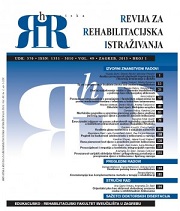Prosocijalnost i empatija u kontekstu integracijskih razreda
Prosociality and Empathy in the Context of Integration Classes
Author(s): Ivana Milošević, Đeni Zuliani, Aldo ŠpelićSubject(s): Education
Published by: Sveučilište u Zagrebu, Edukacijsko-rehabilitacijski fakultet
Keywords: prosociality; empathy; sociometric status; early school age; educational integration
Summary/Abstract: The interest of this investigation is focused on the significance of the context of integration classes for the development of empathy and prosocial behavior of typical pupils. Through the investigation of differences between integration and non-integration classes, the task is to investigate how much a four-year interaction with pupils with disabilities has a meaning for a typical pupils’ development of empathy and prosociality. The study was conducted in twelve fourth-grade classes of elementary school in Pula, which included pupils with disabilities (N=10) and typical pupils (N = 224) in six integration (N = 118) and six non-integration (N=106) classes, the average age M=10.78 (SD = 0.42) years. The results indicated that (1) ten pupils with disabilities have significantly lower social status than other pupils, seven of which are ‘stars of refusing’. (2) Comparing the integration and non-integration classes the expected significant difference between typical pupils in their prosociality and empathy has not been obtained. The specificity of the integration environment has been recognized through gender differences in prosocial behavior and emphatic concern of typical pupils. So in integration classes significant gender differences in prosociality have not been obtained, whereas these have been obtained in non-integration classes. Also in integration classes significant gender differences in emphatic concern have been obtained, while these have not been obtained in non-integration classes. These results suggest that the ‘social request’ for helping in integration classes may reduce gender differences in prosociality but at the same time confrontation with the specific emotional experiences of the integration environment may encourage greater gender differences in empathic concern. Also, the integration class specificity (3) is expressed in the absence of influence of empathic concern for the prosocial behavior of typical pupils, which is obtained in non-integration classes. The results indicate that the integration context has a positive significance for the development of prosociality through the reduction of gender differences, but at the same time it has higher demands on empathic concern development of typical pupils. Thus, these results indicate the need for introducing special programs for developing empathic concern of typical pupils in integration classes.
Journal: Hrvatska revija za rehabilitacijska istrazivanja
- Issue Year: 49/2013
- Issue No: 1
- Page Range: 135-150
- Page Count: 16
- Language: Croatian

